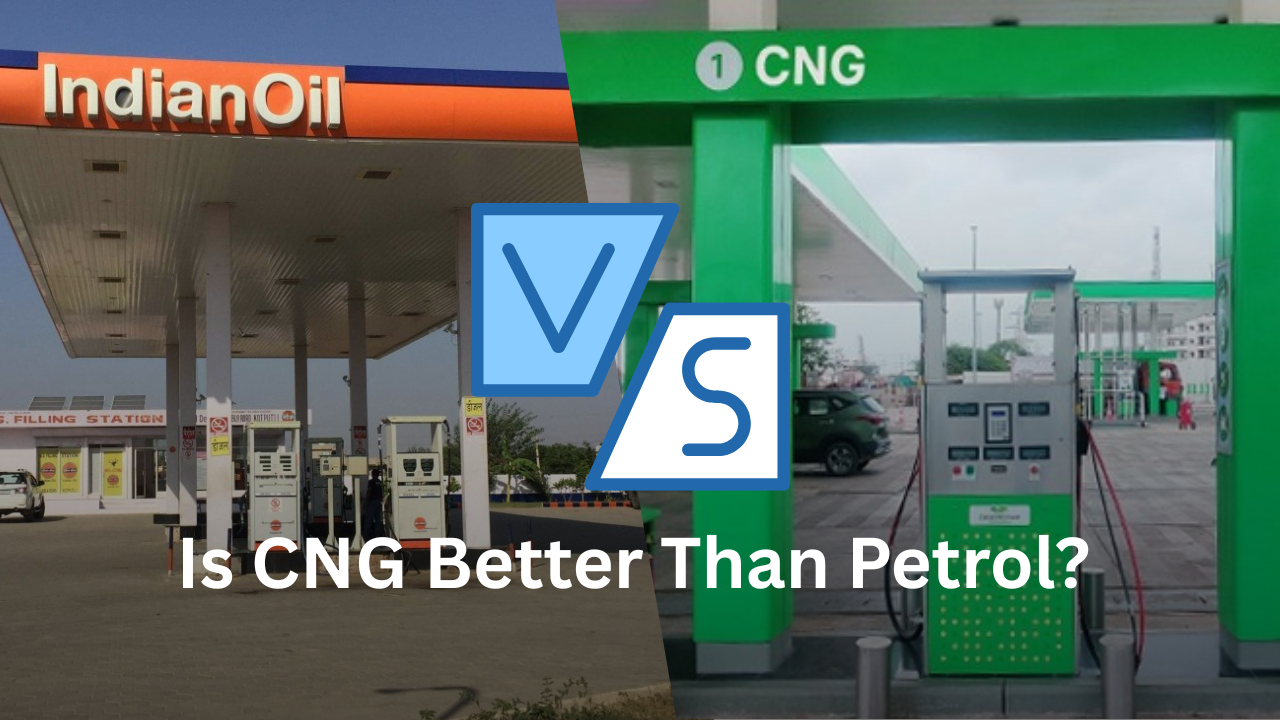Due to the surge in the price of traditional fuels like petrol and diesel, people are slowly moving towards CNG. CNG can be an ideal replacement for petrol and diesel in future because of its cost-effective and environment-friendly nature.

Usage of CNG vehicles has gained instantaneous growth in recent years. In this article, we will discuss the substantial advantages of choosing CNG for your vehicle over petrol.
Let’s get down and explore.
Contents
What Is CNG

CNG, a shorter form of compressed natural gas, is usually composed of methane (up to 90%-95%) and hydrocarbons like propane, ethane, etc.
Generally, CNG is produced by extracting natural gas from underground reserves.
Due to high compression, CNG consumes only 1% of its volume at standard atmospheric pressure. This odorless, pure fossil fuel is generally used for transportation and cooking purposes. Amid price hikes of essential fuels like petrol, diesel, and LPG cylinders CNG is gaining immense popularity among vehicle owners and households as a cost cutting and safe fuel alternative.
Top 5 Benefits of Choosing CNG for Your Vehicle
Below are the benefits of using CNG in cars.
Cost Efficiency

CNG is a cost-effective fuel option, less expensive compared to petrol and diesel.
Among the various benefits of CNG vehicles, cost efficiency is the prominent reason for increasing demand for CNG vehicles in countries like India. CNG vehicles provide exemplary mileage compared to orthodox fuel cars like petrol and diesel. CNG’s combustion characteristics provide an edge over gasoline-powered fuels in fuel efficiency.
Some statistics showcase benefits of CNG fuel that CNG cars can provide up to 20%- 40% fuel efficiency compared to petrol cars.
Also, CNG vehicles provide remarkably better mileage compared to vehicles that operate on fluid fuel. On average, CNG cars deliver up to 30% more mileage than petrol cars on the same quantity of fuel.
Environmental Benefits

Every year air pollution causes the death of a least 2 million people in India. In India out of total air pollution, 51% of pollution is caused by industrial followed by automobile emissions (27%).
Burning of petrol and diesel emits harmful gases like nitrogen dioxide, carbon monoxide, hydrocarbon, and greenhouse gases in environment. On the flip side switching towards eco-friendly CNG dramatically reduces emission.
Research shows CNG produces 6% to 11% lower levels of greenhouse gases. Though CNG cars are not 100℅ pollutants free, they emit paltry amounts of hazardous pollutants compared to petrol cars. The government are India has taken the initiative to install a significant number of compressed biogas plants across India.
Along with building awareness government is eyeing to build strong CNG infrastructure, to establish 17500 CNG stations across India within 2030. Due to its higher octane rating, CNG also yields less noise pollution than petrol or diesel cars.
Engine Performance and Longevity

CNG is cleaner than other fuel engines which leads to less wear and tear in car engines.
Due to less carbon emission CNG engines produce a higher compression which causes lesser damage to the pipes and tubes which drastically increases life span of engines.
It carries a higher octane rate compared to gasoline-fueled engines.
Also, CNG engines produce a higher compression ratio which increases performance ratio compared to petrol engines, resulting in better mileage and longevity.
Widespread Availability
Within a few years, CNG cars have gained immense popularity among Indians but still lacks proper infrastructure. People had to hook up to gigantic lines to get their vehicles fueled up every day. As per March 2024 data Gujrat leads the list with more than 1000 CNG stations followed by Uttar Pradesh and Maharastra.
On the other hand populated states like Bihar and West Bengal are only able to inaugurate 129 and 127 CNG stations respectively. However, the scenario is scheduled to change rapidly within a few years due to rising demand.
Safety Aspects
People are confused about whether green fuels like CNG are safer than petrol vehicles. Below are facts that ascertain CNG is a safe fuel alternative. CNG cars are as secure as petrol cars.
- CNG carries higher ignition temperature than petrol. Where CNG can operate at up to 700 degrees Celsius compared to petrol (455 degrees Celsius). In different circumstances, if sudden temperature rises petrol vehicles catch fire faster than a CNG car.
- In case of any leakage, it fades into the atmosphere.
- Always avoid low-quality, cheap CNG kits. The certified and reliable authority-approved CNG increases your safety.
Conclusion
So, that’s it for now.
Hope the above article on the benefits of choosing CNG for your vehicle has helped you to gain decent knowledge. In this article along with the definition of CNG, we have discussed about 5 major benefits of CNG for your vehicles.
Now it is time to sign off.
If you have any queries or suggestions please write to us are eagerly waiting for your valuable words, thanks.
FAQ About Benefits of Choosing CNG for Your Vehicle
Does CNG Reduce Engine Life Of Vehicles?
No, it’s just a myth. The reality is CNG enhances the span of engine life of your vehicles.
How Much Mileage Is in 1 kg of CNG?
Though mileage relies upon various factors. Generally, a car can run 20-25 kilometres on average on 1 kg CNG.
Does CNG Have High Calorific Value?
CNG carries a higher calorific value compared to petrol. The calorific value of CNG is 50,000 kJ/kg whereas petrol’s calorific value stands at 45000 kJ/kg
Which Fuel Gives More Mileage, CNG or LPG?
CNG provides better mileage compared to LPG.





